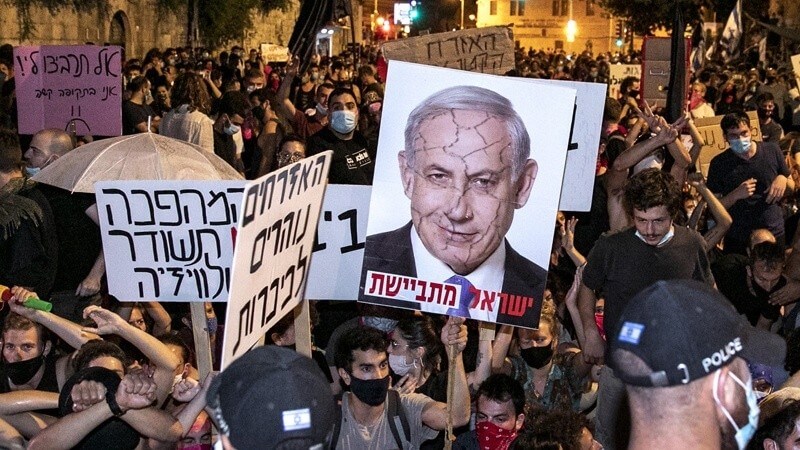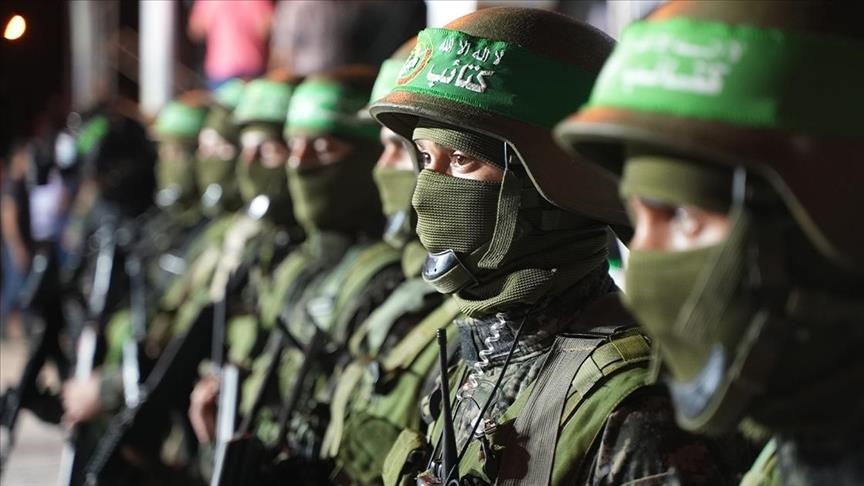Malawians search for relatives buried under the mud as death toll jumps
BLANTYRE, March 17 (Reuters) -In Malawi, where floods swept awayentire villages this month after a storm tore through its southern districts, police officers and soldiers on Friday dug for victims buried under the mud and rocks as the death toll rose sharply.
The storm has pounded the southern African country as tropical Cyclone Freddy swept through the region killing more than 500 people in Malawi, Mozambique and Madagascar since it first made landfall in Africa in late February and circled backfor a second time over the weekend.
While the storm haddissipated, rain continued to hamper rescue efforts as vehicles struggled onflooded roads.
In Malawi, which has suffered the brunt of the storm with 438 killed, soldiers used shovels and picks to exhumebodies in the commercial capital Blantyre and laid themon the ground for identification.
Lieutenant ColonelDickens Kamisa, who participated inthe search, said local authorities identified about eight areas where dead bodies should be buried and were using sniffer dogs to find trapped Malawians.
Chifundo Chilimba, a local resident, told Reuters he could not find his family members as the depth of the mud was too deep.
"My relatives could be deep down under the debris," Chilimba said in his local language of Chichewa, adding that the only thing he was able to find were his family's clothes.
"We are going to bury these clothes I am carrying in the case that they are not found," he added.
To help in search and rescue efforts, foreign aircraft and boats were arriving in Malawi on Friday, officials said.
The country's police inspector, Casper Chalera, told Reuters by telephone that the first rescue vessels will arrive from Zambia and Switzerland, adding that the U.S. and South Africa were also planning to send aid aircraft and boats.
"Two Zambian planes, one carrying relief items and a helicopter for aerial operations have landed," Chalera said.
Lameck Kalenga, Defence Force Deputy Chief of military operations, told media on Thursday that the United Kingdom and Mozambique had also pledged to send military equipment.
The United Nations World Food Programme (WFP) said it was providing food assistance by distributing partially pre-cooked food called corn-soya blend to displaced people.
"(Severe flooding) has inundated farmlands and destroyed produce – just as farmers were about to harvest the only crop of the year - compounding an already difficult year in which 3.8 million people need food assistance," the WFP said in a statement.
It added that the country has been affected by high maize prices and the worst cholera epidemic in decades.
At least 76 people have died in Mozambique, according to government figures. The storm had already killed about 27 people in Madagascar and Mozambique before it lashed Mozambique a second time.
Issued on: 17/03/2023 -
The death toll in Malawi from Cyclone Freddy has risen to 326, the country's president said Thursday, bringing the total number of victims across southern Africa to more than 400 since February.
Rescuers were unearthing more bodies as the chances of finding survivors faded after the cyclone followed a highly unusual course by returning to lash southern Africa's mainland a second time.
"As of yesterday, the death toll from this disaster has risen from 225 to 326," Malawi's President Lazarus Chakwera said in the devastated southern region near the commercial hub Blantyre.
"The number of people displaced has more than doubled to 183,159, as has the number of households displaced, which now stands at 40,702," he added.
Chakwera renewed his appeal for global aid as rescuers continued to seek survivors on Thursday from the flooding and mudslides caused by torrential rains this week.
More than 300 emergency shelters have been set up for survivors, while the army and police have been deployed to deal with the crisis.
Two weeks of national mourning and a state of emergency have been decreed in the country.
"The cyclone has destroyed property, homes, crops, and infrastructure, including bridges that have cut off communities that desperately need help," Chakwera said.
The cyclone first struck southern Africa in late February, striking Madagascar and Mozambique but causing only limited damage in landlocked Malawi.
The storm then moved back out over the Indian Ocean, where it drew more power from the warm waters before making a rare course reversal to slam into the mainland a second time.
05:46
The rains have eased since Wednesday but Freddy is still on track to become one of the world's longest tropical storms.
In Mozambique, the storm has caused at least 73 deaths and displaced tens of thousands of people over the past weeks and killed a further 17 people in Madagascar.
Mozambican President Filipe Nyusi has also appealed for emergency aid to rebuild destroyed infrastructure after visiting the stricken province of Zambezia, which borders Malawi.
'Overwhelming stench'
Lacking sniffer dogs and armed just with shovels, rescuers in Malawi made a grim hunt for buried and decomposing bodies lying amid the debris from destroyed homes.
In Manje, a township around 15 kilometres (nine miles) south of Blantyre, five bodies were recovered after locals said they had spotted bubbles forming under the muddy rubble.
"The overwhelming stench in the air is a clear sign that the corpses are rotting underneath," said an elderly resident, Rose Phiri, as she watched the machine spade through the rubble.
Meteorologists say the cyclone is exceptional in its duration and has characteristics consistent with warnings about climate change.
"It's been an incredibly long lasting storm. We can see from today's satellite imagery and from the last couple of days it has dissipated," Randall Cerveny of the World Meteorological Organization told AFP.
Roxy Mathew Koll, a climate scientist at the Indian Institute of Tropical Meteorology, said the warm ocean "is a key aspect contributing to rapid intensification of cyclones".
"Cyclone Freddy underwent rapid intensification seven times during its lifetime," he said.
(AFP)
The storm, likely the longest lasting in the southern hemisphere, has killed hundreds of people displaced hundreds of thousands.
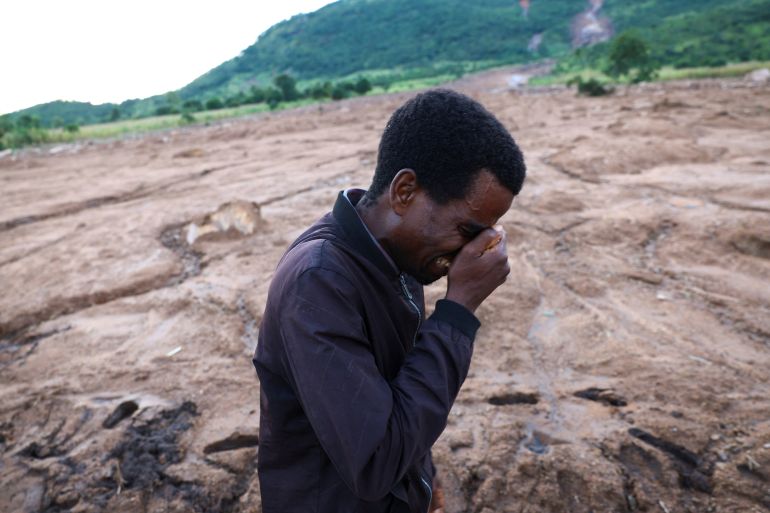
By Rabson Kondowe
Published On 17 Mar 2023
Blantyre, Malawi – Four days after Grace Mastala was forced to flee her home at the foot of the Soche Quarry community at the base of a hill in Malawi’s commercial capital of Blantyre, she is still looking for her 13-year-old son, dead or alive.
Mother and child were separated by Cyclone Freddy, a record-breaking storm that made its way into the southern African country and its eastern neighbour Mozambique last weekend.
As of Thursday, there have been more than 300 documented deaths in both countries and nearly 90,000 people have been displaced as their homes were swept away.
Mastala who works as a housekeeper, was on her way home on Monday at about 11am when mudslides came roaring down Soche Hill, interrupting her journey.
“It was right in front of me, it was scary,” the mother of two recounted to Al Jazeera on Thursday. “Fortunately, some people from the area who were running away managed to grab my daughter but my son was never with them.”
The World Meteorological Organization has said the cyclone which formed in February off the northern coast of Australia before making its way to southeastern Africa, may be the longest lasting storm in the southern hemisphere.
In neighbouring Mozambique, officials report at least 20 people have died since the cyclone made landfall in the port town of Quelimane on Saturday night.
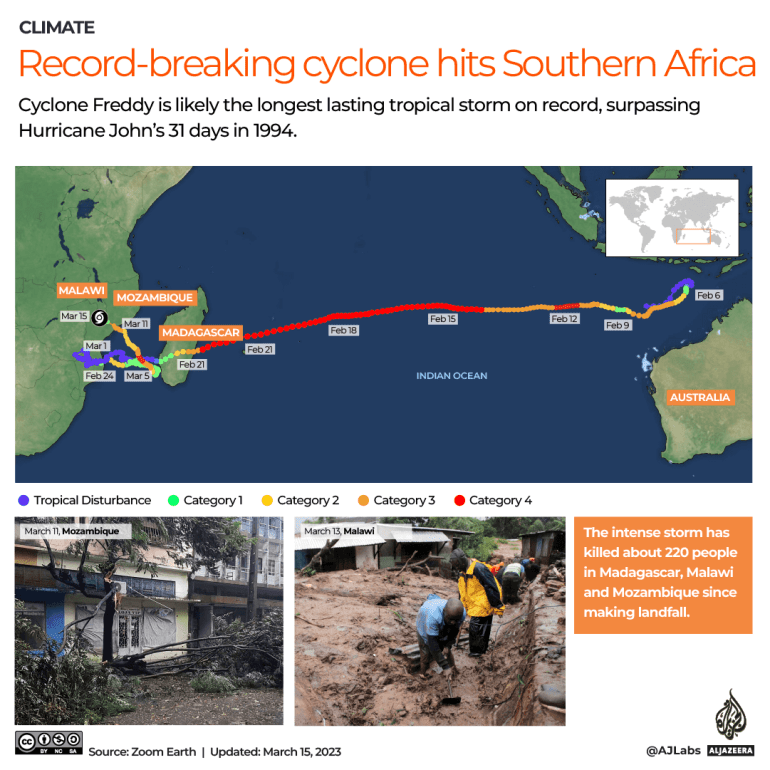
‘We need help’
Freddy, which has now dissipated, caused widespread devastation in Malawi, including to critical infrastructure. Roads have been cut off and electricity poles have fallen down, according to the Electricity Generation Company Limited (EGENCO).
Malawi has declared a state of emergency.
“Even though the cyclone is gone, the country is expected to keep receiving heavy rains along lakeshore areas which are likely to trigger flash floods, ” a statement from the Department of Disaster Management Affairs, DODMA on Thursday read.
Schools have also been shut down in Blantyre and across the entire southern region of Malawi. Consequently, 165 camps have been built in schoolyards and classrooms across the city to provide shelter for affected households.
Malinga Namuku, the manager at Manja Primary School camp in the heart of the city said well-wishers and nonprofit organisations have provided a lot of support in the form of food and clothes.
“We hope that more support will keep coming because the people here are just too many,” he said. “We have asked the government to find us a place somewhere with tents erected because we don’t know how long people are going to be here, as schools also need to continue, especially for the examination classes.”
During a visit to the affected areas on Wednesday, President Lazarus Chakwera declared a 14-day national mourning period.
In his speech, Chakwera said he authorised the release of 1.6 billion kwacha ($1.5m) to assist Malawians affected by the cyclone.
“I can already tell you that this money will not be nearly enough,” he said. “The level of devastation we are dealing with here is greater than the resources we have at our disposal.”
The president appealed to the international community to “please look at us with such favour because we need help“.
Some private citizens, multinational companies as well as the United Nations and United States Agency for International Development have started proving some relief.
The United Nations released a statement on Wednesday indicating that it has provided support to establish an operations emergency centre in Blantyre for humanitarian coordination among government and NGOs.
The UN said it is also “providing critical logistical support, including transportation for search and rescue operations as well as to ferry humanitarian workers, equipment and supplies to communities that have been cut off by flooding and landslides, as well as medical supplies and equipment to improve water and sanitation infrastructure to address immediate health needs”.
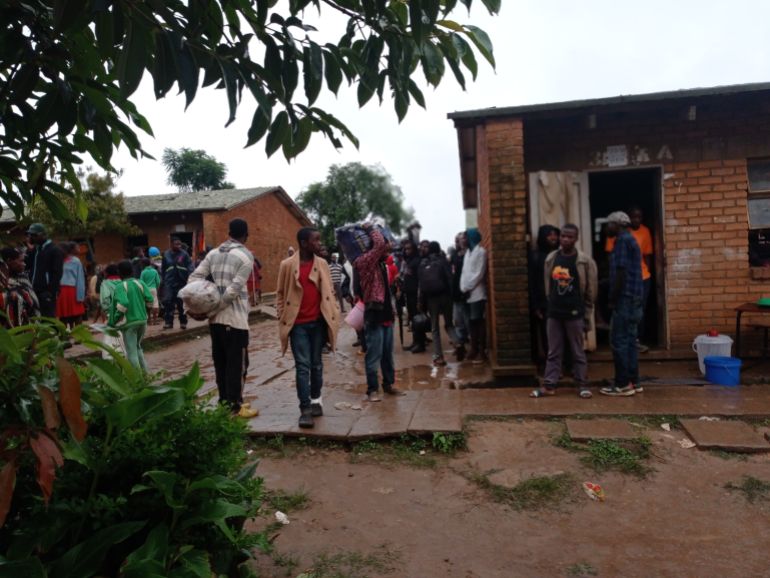
‘Feels like a nightmare’
Many of the 5,000 people to have sought refuge at Manja are distressed. Some have lost their homes and barely escaped alive.
Yohane Pangani, also from Soche, managed to escape just before the home he shared with nine relatives was engulfed by mudslides.
“We have lost everything, our house is gone, but we are grateful that every one of us still has life, and we all made it to this camp,” the 25-year-old said.
Before leaving the area, Pangani worked alongside his friends to rescue seven people, including a pregnant woman, buried in the mudslides. He was set to begin a programme at a teacher’s training college in Blantyre in April but now has to wait longer because the cyclone has disrupted life in the city.
Belita Freyal, a 45-year-old mother of six, was at the market selling vegetables on Saturday when she saw the floodwaters approaching. She panicked and fled, leaving behind all her goods and sustaining injuries in the process.
The floods washed away her vegetable farms, the main source of income for her family, and she is now worried about how to repay debts she took on for her business.
“I am happy that my family is safe but I am also worried because the business was the bread and butter for my family, considering that my husband is out of work,” she told Al Jazeera.
Meanwhile, on Monday afternoon, Mastala arrived at Manja with only one child by her side and has been searching for the missing one since.
“I don’t know where my son is,” she said, sombrely. “I’m just coming from Queen Elizabeth [Central Hospital] to see if he was maybe being treated in the wards. I even went to the mortuary to see if I could find his body there.”
Earlier in the day, bodies were brought to the camp for the survivors to identify. Her son was not among them.
For Mastala, sifting through the ruins left behind by the cyclone is hard, but is compounded by the knowledge that her son is yet to be found and her family is homeless.
“I just cannot afford to move on from this,” she said, tears rolling down her cheeks. “Where will I even go when it is time to leave the camp? It all just feels like a nightmare.”
:quality(70)/cloudfront-eu-central-1.images.arcpublishing.com/thenational/FQKNYAZKBCEF2TUHIHCLXEUSTQ.jpg)






